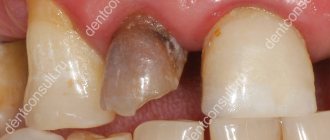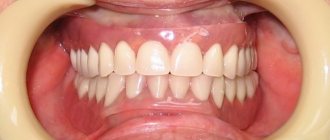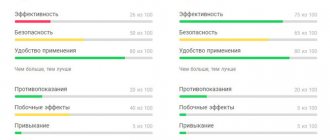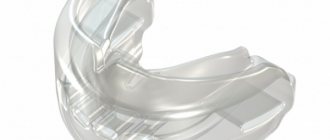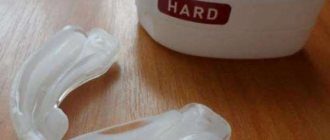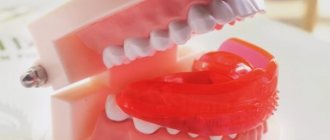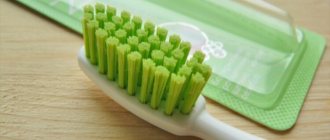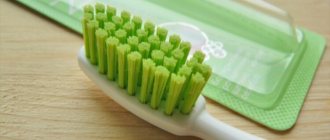Contraindications
Pentalgin has special precautions that must be taken into account when choosing this remedy for the treatment of tooth pain. The drug is prohibited for the following conditions:
- Presence of diabetes mellitus;
- Open ulcers and bleeding in the gastrointestinal tract;
- Problems with the heart and vascular system;
- Acute liver and kidney problems;
- Hepatitis of viral etiology;
- Tendency to epileptic seizures;
- Old age of patients;
- Childhood and early adolescence;
- Condition after any heart surgery;
- Tachycardia or other heart rhythm disturbances;
- Pregnancy and lactation period;
- Frequent increase in pressure in the arteries;
- Individual negative reactions of the body.
Pentalgin painkiller tablet. 24 pcs.
Active substance:
1 tablet contains: paracetamol - 325 mg, naproxen - 100 mg, caffeine anhydrous - 50 mg, drotaverine hydrochloride - 40 mg, pheniramine maleate - 10 mg.
Excipients:
Microcrystalline cellulose - 128.0000 mg, potato starch - 55.3800 mg, croscarmellose sodium - 32.0000 mg, hyprolose (hydroxypropylcellulose) - 32.5200 mg, citric acid monohydrate - 3.0000 mg, butylated hydroxytoluene (E 321 ) - 0.3000 mg, magnesium stearate - 7.2000 mg, talc - 16.1200 mg, quinoline yellow dye (E 104) - 0.4608 mg, indigo carmine (E 132) - 0.0192 mg; Shell: hypromellose (hydroxypropyl methylcellulose) - 12.1700 mg, povidone (medium molecular weight polyvinylpyrrolidone, povidone-K25) - 3.8700 mg, polysorbate-80 (Tween-80) - 1.1000 mg, titanium dioxide - 3.4300 mg, talc - 4.2180 mg, quinoline yellow dye (E 104) - 0.2000 mg, indigo carmine (E 132) - 0.0127 mg, or OPADRAY 13A210001 Green shell (OPADRY 13A210001 GREEN) - 25.0007 mg [hypromellose - 12 ,1700 mg, povidone - 3.8700 mg, polysorbate-80 -1.1000 mg, titanium dioxide - 3.4300 mg, talc - 4.2180 mg, quinoline yellow - 0.2000 mg, FD&C blue #2/ indigo carmine - 0.0127 mg].
Description:
Let's do it without pain! Pentalgin® is a patented five-component pain reliever that has a pronounced analgesic effect, relieves spasms and relieves inflammation.
Strengthens the analgesic effect due to the combination of active ingredients; Simultaneously affects various stages of pain syndrome formation; Reduced doses of the main analgesic components compared to single drugs; It has a complex effect: it is simultaneously analgesic, anti-inflammatory, antispasmodic and antipyretic; Relieves pain of various origins; Film-coated tablets are easier to swallow and provide better stability of the active ingredients.
Light green to green, biconvex, capsule-shaped tablets with beveled edges, scored on one side and PENTALGIN embossed on the other. On a cross section, the kernel is light green with white splashes
Release form:
Film-coated tablets. 12 tablets each in a blister pack made of polyvinyl chloride film and printed varnished aluminum foil. 2 blister packs along with instructions for use in a cardboard pack.
Treatment of aching pain in teeth
Only a dentist can determine the exact cause of aching toothache and provide proper treatment. Analgesics and folk remedies temporarily alleviate the condition before visiting a doctor.
Aching toothache after treatment, filling or grinding
Usually, after grinding of pulpless teeth, pain does not bother you, and if they are “alive”, then the discomfort goes away after 3-5 days.
Painful sensations can also occur after treatment of caries, pulpitis, as a reaction to the impact of a drill or composite material. The pain may persist for up to 2 weeks. Usually occurs when pressure is applied to the surface of the tooth or when hard food enters. During this time, tertiary dentin is formed under the filling, protecting the pulp, and after that the aching toothache no longer bothers you.
Normally, such pain fades gradually. But if a reverse reaction occurs, that is, the pain intensifies, you need to consult a doctor. The cause may be an inflammatory reaction due to improper filling or sanitation of the canal. With untreated caries, the pathological process will spread to the pulp and provoke its inflammation. In both the first and second cases, it is necessary to consult a doctor again for canal sanitation.
Before contacting a doctor, analgesics, for example, Naiza 100 mg tablet, will help relieve pain.
IMPORTANT! It should be remembered that you should not take more than 4 tablets per day, for children over 12 years old - no more than 3 times.
The duration of action of the analgesic is 4 hours. For children under 12 years of age, paracetamol syrup is recommended.
Normally, aching pain in a tooth subsides within 1-2 days after treatment.
If there is nothing at hand and the aching pain is unbearable, you can use acupressure. It reflexively connects acupuncture points on the face or hand with the corresponding area of the oral cavity.
- He-gu points are located in the cavity between the thumb and index finger of the hand. For pain on the right, massage the left hand and vice versa. The movements should be pressing. The finger of the opposite hand is moved up and down for 3 minutes until it turns red.
- Jia Che points are located on the convexity of the masticatory muscles when the jaws are closed. Massaging movements should be light and circular. 30 movements are performed in one approach. You can do no more than 5 approaches at a time.
If the aching pain does not go away for more than a month, then this is evidence of an ongoing carious process. In this case, radiography is needed to identify the cause of pain after filling and to re-treat the tooth.
How to get rid of aching pain in the gums and teeth
A common cause of aching pain in the tooth and gum is the eruption of a wisdom tooth. This can be evidenced by the so-called “hood” that covers the erupting tooth. The gums at the site of growth swell and give pain, which intensifies with pressure.
To reduce the pain, you need to drink anesthetics and go to a dental clinic, where the hood of the mucous membrane will be trimmed. If there is not enough space for a wisdom tooth to grow, it grows at an angle, displacing other teeth, causing severe pain. In this case, removal is carried out.
Analgesics, for example, Nimisil granules, will help reduce pain before going to the clinic. The drug can be taken twice a day, 100 mg (1 sachet). It is dissolved in boiled water and drunk after meals. You can rinse your mouth with saline or soda solution.
Aching pain in the gums and teeth can be a symptom of chronic pulpitis, abscess or phlegmon.
How to relieve aching pain in the tooth and jaw
Aching pain in the tooth and jaw can be a sign of periodontitis, that is, inflammation of the tissues surrounding the tip of the tooth root. Typically, this process develops as a complication of pulpitis, with tooth trauma, after its removal.
To relieve pain before visiting a doctor, you can take a Ketorol tablet (10 mg) with a strong analgesic effect. The drug is contraindicated in children under 16 years of age. You should not take more than 4 tablets per day. The mouth should be rinsed with furatsilin solution.
How to relieve toothache at night
At night, the aching pain in the tooth intensifies due to changes in body position, which causes increased blood supply to the head
It has been noticed that constant aching pain in the tooth weakens during the day and intensifies in the evening, reaching a peak at night. It interferes with sleep and causes suffering. Dentalgia can occur with pulpitis, periodontitis, inflammation of the middle ear, and sinusitis.
Increased pain at night is associated with a change in body position, when the blood supply to the head increases, and during inflammatory reactions, swelling occurs, which compresses the trunk of the trigeminal nerve and its nerve endings. The second reason when a tooth hurts, and the aching pain intensifies at night, physiologists consider the activity of the adrenal glands, which during the day produce corticosteroids that reduce swelling and the inflammatory response. By evening their activity dies down.
To avoid night pain, you can take Diclofenac 50 mg tablet. If it is unbearable, then the dosage can be increased to 100 mg (2 tablets). This drug has a prolonged effect and will help relieve pain throughout the night.
IMPORTANT! The next day, you should immediately contact your dentist to determine the exact cause of the pain.
The doctor will provide treatment and relieve the aching pain in the teeth, or refer you to a specialized specialist if there is a suspicion that the pathology is non-odontogenic.
How to reduce toothache under a crown
Sometimes the tooth starts to hurt under the crown. If aching pain appears soon after treatment and prosthetics (installation of a crown), then we can talk about a complication after treatment due to insufficiently thorough treatment of the canal. In this case, it is necessary to remove the crown, remove the filling material and sanitize the canals again.
An allergic reaction to filling materials can manifest itself in the form of pain. In this case, replacement of fillings is necessary. Pain also occurs when the dental canal is not completely sealed due to the peculiarity of its structure. In this case, you need to contact a dentist who works with complex cases. We have such specialists.
To relieve pain before contacting a specialist, analgesics, for example, 200 mg (1 tablet) of ibuprofen, will help. Rinsing your mouth with tooth elixir will help reduce pain.
Pentalgin: key characteristics
The drug works on 5 substances. The most famous is drotaverine, the main component of No-Shpa, which is an antispasmodic. Paracetamol is in most cases used as an antipyretic substance, but at the same time it also has a weak analgesic effect. Other main components of Pentalgin:
- Caffeine. A psychostimulant that tones the body, dilates blood vessels, and also enhances the effect of analgesics. In Pentalgin, it also neutralizes the hypotensive effect of drotaverine, so blood pressure drops less frequently when taking the tablet than when using No-Shpa.
- Naproxen. A non-steroidal anti-inflammatory substance that suppresses the production of prostaglandins and thereby reduces pain.
- Pheniramine. It is an H1-blocker of histamine, necessary to enhance the effect of analgesic components.
Thanks to this composition, Pentalgin has a very wide spectrum of action: it can cope with pain that is associated with muscle spasms, vascular, and inflammatory processes. For this reason, it is used in dental, gynecological, and gastroenterological practice. However, keep in mind that the drug does not cure, but only blocks the symptoms of the disease.
As for how long it takes for Pentalgin to act for a headache or toothache, the reason for taking it plays almost no role. The form of the drug is much more important. The tablets slowly penetrate the digestive tract, from where all substances are absorbed into the blood. Therefore, the product begins to work only after an hour. If you give an injection, the effect can be observed after 15 minutes. Intravenous administration (dropper) gives the fastest results - after 3-5 minutes. The duration of action is 4-6 hours, but we must not forget about the individual reaction of the body. For some, this period may be reduced.
Side effects and overdose
At the very beginning of treatment for dental pain with Pentalgin, the patient should listen to his condition. If at least one of the following effects is noticed, you should stop taking the drug. Consultation with a doctor is recommended.
What can Pentalgin cause in a patient?
- Allergy in any form: hives, skin rashes, swelling and itching
- Disturbances in the composition of the blood, its dangerous conditions
- Strange reactions of the central nervous system that have not been observed before: increased anxiety, sleep disturbances, decreased attentiveness
- Malfunction of the heart and blood vessels, which is expressed in increased heart rate, increased blood pressure, and interruptions in the heart
- Discomfort in the gastrointestinal tract: vomiting, colic, constipation, liver disorders, stomach ulcers
- Urinary disorders
- Adverse sensory organ reactions: decreased vision and hearing, tinnitus
- Other manifestations not noticed before: breathing problems, dermatitis
There is a particularly high risk of complications in those patients who deliberately take a higher dose of Pentalgin.

